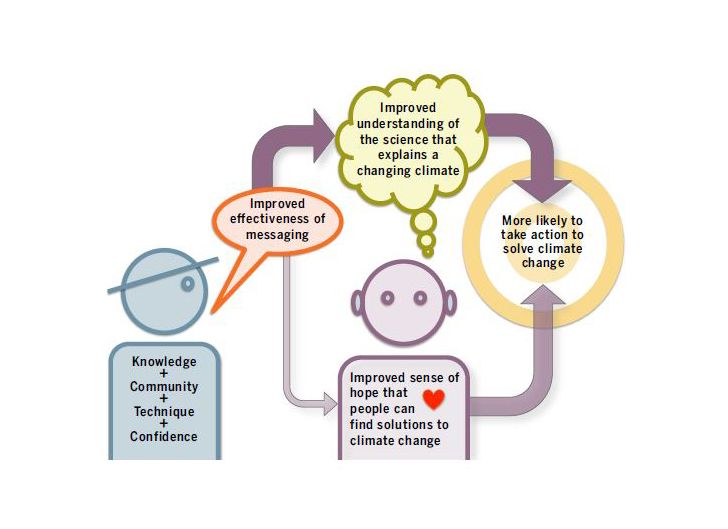National Network for Ocean and Climate Change Interpretation (NNOCCI) Impacts After 5 Years

Since 2009, the National Network for Ocean and Climate Change Interpretation—better known as NNOCCI—has been a collaborative effort to raise the discourse around climate change and ocean acidification. Led by the New England Aquarium, this evolving partnership includes the Association of Zoos and Aquariums, Frameworks Institute, Woods Hole Oceanographic Institution, National Aquarium, Monterey Bay Aquarium, Ohio’s Center of Science and Industry, NewKnowledge and Pensylvania State University and has been funded through the generous support of the National Science Foundation, National Oceanic and Atmospheric Administration and Institute for Museum and Library Services.
The concerted effort of this project over the last 6 years has been to disseminate a mode of science communication that is backed by research. This Strategic Framing approach is helping to shift the conversation toward solutions that our communities can implement to reduce the impacts of climate change and ocean acidification.
From the report:
“The results of our evaluations so far show NNOCCI is having a positive impact. NNOCCI equips educators and scientists with four essential tools to bring their message to the public: knowledge about climate change science, effective communication techniques, a supportive community of NNOCCI members, and confidence to do this difficult work. NNOCCI members’ improved messaging contributes to better understanding of climate change among people they talk to. In turn, these people are more likely to take action to solve climate change. These exciting findings demonstrate the positive influence NNOCCI already has, with the possibility to bring the message of climate change solutions and hope to more people across the US.”
More Blog Posts
 We Need a Sea Change in How We Communicate about Ocean Change. Metaphors Can Help.We Need a Sea Change in How We Communicate about Ocean Change. Metaphors Can Help. October 28 2016 This is the fourth post in a series about framing ocean and climate change. We depend on our oceans and must protect them, yet they are often overlooked in public conversations about “climate change.” As a result, most people don’t understand how [READ MORE]
We Need a Sea Change in How We Communicate about Ocean Change. Metaphors Can Help.We Need a Sea Change in How We Communicate about Ocean Change. Metaphors Can Help. October 28 2016 This is the fourth post in a series about framing ocean and climate change. We depend on our oceans and must protect them, yet they are often overlooked in public conversations about “climate change.” As a result, most people don’t understand how [READ MORE] NNOCCI Climate Science FundamentalsNNOCCI Climate Science Fundamentals by Megan Ennes, July 15 2020 In this blog, we talk about some of the basics of climate change. An understanding of climate science is the foundation of climate communication and action. Weather Versus Climate One of the most common misunderstandings when talking about climate change is the difference between [READ MORE]
NNOCCI Climate Science FundamentalsNNOCCI Climate Science Fundamentals by Megan Ennes, July 15 2020 In this blog, we talk about some of the basics of climate change. An understanding of climate science is the foundation of climate communication and action. Weather Versus Climate One of the most common misunderstandings when talking about climate change is the difference between [READ MORE] Museums Mobilizing Climate ActionMuseums Mobilizing Climate Action Billy Spitzer, August 06 2018 (Excerpted from a commencement speech for the Harvard Extention School Museum Studies Program) The Role of Museums In Tackling Climate Change At the New England Aquarium, I spend most of my time working at the intersection of museums and sustainability. About 10 years ago, we realized [READ MORE]
Museums Mobilizing Climate ActionMuseums Mobilizing Climate Action Billy Spitzer, August 06 2018 (Excerpted from a commencement speech for the Harvard Extention School Museum Studies Program) The Role of Museums In Tackling Climate Change At the New England Aquarium, I spend most of my time working at the intersection of museums and sustainability. About 10 years ago, we realized [READ MORE] Newly Released: The Drawdown ReviewNewly Released: The Drawdown Review by Elizabeth Bagley, May 22 2020 Reprinted with permission from The Drawdown Review by Project Drawdown © 2020 Project Drawdown. All rights reserved. In the spring of 2017, Project Drawdown released its inaugural body of work on climate solutions with the publication of the best-selling book Drawdown and [READ MORE]
Newly Released: The Drawdown ReviewNewly Released: The Drawdown Review by Elizabeth Bagley, May 22 2020 Reprinted with permission from The Drawdown Review by Project Drawdown © 2020 Project Drawdown. All rights reserved. In the spring of 2017, Project Drawdown released its inaugural body of work on climate solutions with the publication of the best-selling book Drawdown and [READ MORE] Thinking Bigger On SolutionsThinking Bigger On Solutions by Allison Arteaga, February 28 2020 We all know that we need big, systems-level change in our society in order to address climate change and create a better future. This requires high-impact collective actions that create change at the cultural and public levels by bringing people together (Frameworks). The challenge [READ MORE]
Thinking Bigger On SolutionsThinking Bigger On Solutions by Allison Arteaga, February 28 2020 We all know that we need big, systems-level change in our society in order to address climate change and create a better future. This requires high-impact collective actions that create change at the cultural and public levels by bringing people together (Frameworks). The challenge [READ MORE]